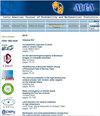具有无数等位基因的进化模型
IF 0.6
4区 数学
Q4 STATISTICS & PROBABILITY
Alea-Latin American Journal of Probability and Mathematical Statistics
Pub Date : 2022-04-30
DOI:10.30757/alea.v20-38
引用次数: 0
摘要
我们研究了一类进化模型,其中繁殖过程涉及任意交换过程,允许突变出现。种群规模$n$是固定的,因此在繁殖之后,进行选择。个体的特征是他们的基因组,从一组X$中挑选出来(这可能是不可数的),每个基因组都有一个适合度。不太适合意味着在选择过程中被淘汰的可能性更高。该过程的平稳分布可以被描述和研究。我们感兴趣的是当n趋于无穷时这个平稳分布的渐近特性。选择一个参数$\lambda>0$来调整当$n$增长时的适应度缩放,我们证明了繁殖过程不依赖于$n$的情况和由Dirichlet过程先验给出的情况下的极限定理。在这两种情况下,极限都表现出依赖于参数$\lambda的相变本文章由计算机程序翻译,如有差异,请以英文原文为准。
An evolution model with uncountably many alleles
We study a class of evolution models, where the breeding process involves an arbitrary exchangeable process, allowing for mutations to appear. The population size $n$ is fixed, hence after breeding, selection is applied. Individuals are characterized by their genome, picked inside a set $X$ (which may be uncountable), and there is a fitness associated to each genome. Being less fit implies a higher chance of being discarded in the selection process. The stationary distribution of the process can be described and studied. We are interested in the asymptotic behavior of this stationary distribution as $n$ goes to infinity. Choosing a parameter $\lambda>0$ to tune the scaling of the fitness when $n$ grows, we prove limiting theorems both for the case when the breeding process does not depend on $n$, and for the case when it is given by a Dirichlet process prior. In both cases, the limit exhibits phase transitions depending on the parameter $\lambda
求助全文
通过发布文献求助,成功后即可免费获取论文全文。
去求助
来源期刊

Alea-Latin American Journal of Probability and Mathematical Statistics
STATISTICS & PROBABILITY-
CiteScore
1.10
自引率
0.00%
发文量
48
期刊介绍:
ALEA publishes research articles in probability theory, stochastic processes, mathematical statistics, and their applications. It publishes also review articles of subjects which developed considerably in recent years. All articles submitted go through a rigorous refereeing process by peers and are published immediately after accepted.
ALEA is an electronic journal of the Latin-american probability and statistical community which provides open access to all of its content and uses only free programs. Authors are allowed to deposit their published article into their institutional repository, freely and with no embargo, as long as they acknowledge the source of the paper.
ALEA is affiliated with the Institute of Mathematical Statistics.
 求助内容:
求助内容: 应助结果提醒方式:
应助结果提醒方式:


